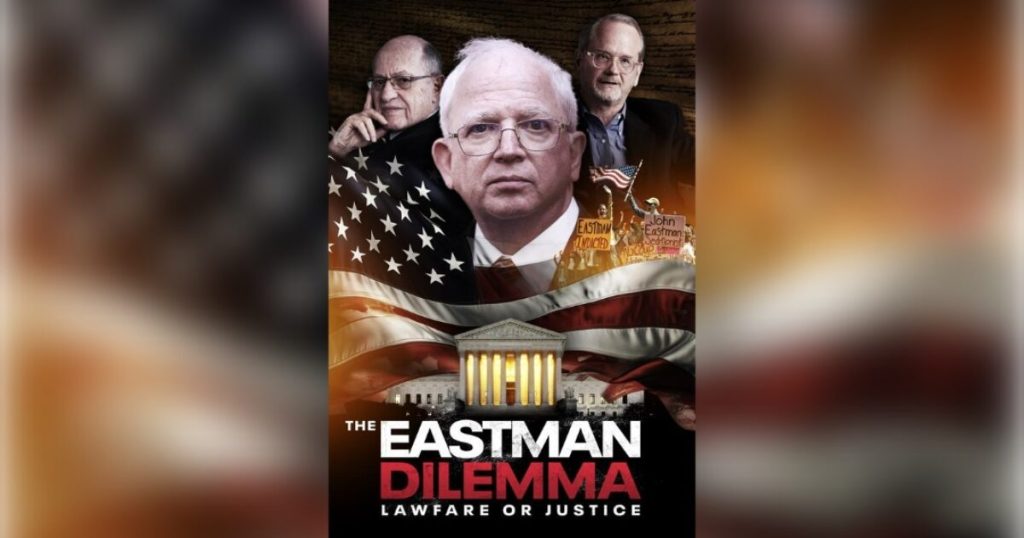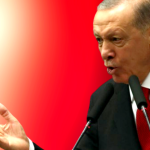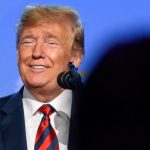

John Eastman, the Claremont Institute scholar and conservative firebrand who stood by President Trump’s side all throughout some of the darkest days in the aftermath of the 2020 presidential election when the republic was on the line, will have his story told for the first time on the silver screen come the new year.
The documentary, titled The Eastman Dilemma: Lawfare or Justice, is slated for a fitting January 6th, 2025, release date, the fourth anniversary of the January 6th demonstration (but will premiere at Mar-a-Lago in a special event two days earlier).
The film marks the culmination of a years-long ordeal that has seen Eastman, once universally revered as a foremost authority in constitutional construction and history, targeted by one of the most ruthless and sustained lawfare campaigns against any attorney in American history.
Eastman, alongside former US Assistant Attorney General Jeff Clark and Mayor Rudy Giuliani, were systematically maligned, censured, and even disbarred for simply arising to a timeless call of both client and their profession by providing legal representation.
Eastman’s story is harrowing – and forebodes much darker times to come if we do not provide a radical course correction to the current state of affairs.
That his representation of Donald Trump occurred at such a critical time in the nation’s history whereby most of the political world – unlike now – turned their backs to him was sufficient reason to make a scapegoat out of Eastman and a few select aforementioned peers.
The reason, of course, was self-evident: the system wanted to kowtow all future lawyers into submission – from not only never again representing Donald Trump.
But from creating a chilling effect profession-wide so that no future attorney would ever dare to think about representing any conservative cause or movement aligned with the former and now president-elect’s broader political mission whatever.
The Left capitalized on this tragic state of affairs – and made life hell for Eastman – by exploiting Donald Trump at his weakest moment, in the immediate days and weeks after the stolen November 2020 election, and particularly after January 6th, when the 45th President was ignominiously ousted from the Swamp, many writing him off for good.
While fate had something else in store for both Donald Trump and country, precipitating maybe the greatest political comeback in American history, that victory did not come without significant personal costs to the many who rested uncompromisingly on their conditions and faith during the wilderness years.
Eastman’s was a standout case – especially for someone of his notoriety. Despite stellar credentials, he was forcibly exiled from the profession.
Having graduated from one of the nation’s finest law schools (University of Chicago) and clerked for Supreme Court Justice Clarence Thomas, Eastman made a career of his passion for law and love for the country and history.
He started off by working at one of the country’s most prestigious law firms, Kirkland & Ellis, specializing in constitutional litigation, before transitioning to teaching law full-time.
As a professor, he enjoyed professorial stints at both Chapman University Fowler School of Law and the University of Colorado Boulder.
He also was the founding-director for the Claremont Institute’s Center for Constitutional Jurisprudence, a think-tank devoted to educating and championing an originalist and textualist interpretation of the Constitution, in conformance with its framers’ intended and historic purpose.
By any measure, Eastman climbed the highest peaks of the legal profession – and then some. Top law school; Supreme Court clerkship; partner at big law; adviser to the President of the United States.
But his career is made even more admirable by its trajectory: rather than coast as a partner raking in millions at a fancy firm, Eastman, following some of his great mentors – including Justice Thomas himself, found the path less taken of teaching more fulfilling and more noble.
And boy did Americans benefit from that decision. At a time in which so many Americans do not know their history, particularly of the Revolutionary era out of which our Constitution was carved, Eastman devoted his energies to championing and illuminating this great tradition for our generation.
This decision reveals the noble side of Eastman’s vocation: America’s Constitution, the lynchpin for freedom the world over, is at grave risk of dying – in part because of our own ignorance, in part because far too many otherwise capable men abandoned their civic duties to make the necessary sacrifices to keep it alive.
If not for men like Eastman, who put aside self-interested desires for the greater good, then the republic would not have withstood the test of time – and the torch of American freedom would have died out this generation.
To purchase tickets and learn more about the film, please visit eastmandilemma.com/maralago.
The last four years are a searing case study of what happens when the project of freedom is forsaken. Eastman was summoned to provide legal representation to his client: the President of the United States.
Part of what made Eastman’s legal advocacy so difficult – despite being vindicated in both the law and, as time would tell, history – was the fact that so few people, including the tribunals tasked with adjudicating these fundamental questions, are today familiar with the issues.
What initially got Eastman in trouble was confusion over a fairly straightforward constitutional issue: namely, whether the President has the ability to request that his Vice President return fraudulent or legally doubtful slates of electors to their respective states for further inquiries.
That was it. This was not, as the media unwisely framed, the President beseeching his number two to “overturn” a presidential election. Nor was this the crazed theory of a madman lawyer seeking to make a name for himself by discrediting the results of a democratic election.
Instead, this was a lawyer providing representation to his client, as is the client’s right – and the lawyer’s duty – under the Constitution. Presidents, like any private citizen, have a Sixth Amendment right to zealous advocacy.
Eastman, the lawyer and constitutional expert, had the right to offer his sound legal judgment on a hotly contested constitutional problem.
A significant portion of the country – including not just Republicans, but many Independents and Democrats as well – have long believed America’s elections fraudulent, particularly with the lack of universal Voter ID.
These controversies reached a hot boil in the lead-up and immediate aftermath of the November 2020 election, the most controversial presidential race in modern history, if not all time, as laws were changed with impunity under the pretext of an unprecedented global pandemic, creating confusion and ripe opportunities for widespread cheating.
In an electoral system like ours, where the outcome is decided by a few ten thousand votes in a deeply polarized nation distributed across three or four key swing states, the President’s duty to ensure that our laws be faithfully executed, with reassurances to the public’s confidence, becomes of chief importance.
This is naturally the case every election cycle. But was of paramount concern in 2020, a year of untold riots and norm-breaking rules changes to election law, which made the President’s constitutional prerogative of outsized import.
This was already apparent on the morning of January 6th, 2021, when hundreds of thousands of overwhelmingly peaceful demonstrators descended upon the Capitol to voice their outrage for how the 2020 race was carried out. By later that afternoon, when the mob became even more agitated and a small riot broke out, the need for reassurance – in a safe and orderly electoral process – reached maximum urgency.
In hindsight, knowing how mentally debilitated a condition Joe Biden was in, it only reinforces the public perception – including those led to riot on January 6th – that the entire election result was an illegitimate sham, being pulled off by subversive agencies and actors within government and the press to thwart Donald Trump and the public support he so readily and easily commands.
Four years later, in light of this most recent consequential and landslide election, it only further vindicates the widespread doubts about 2020 – doubts which persist, and will remain so as long as the ultimate verdict of January 6th remains in limbo.
It also vindicates the theories of lawyers, like John Eastman, who insisted at the time in standing firmly behind the Constitution and its textual mandate, despite the titanic public pressures working against it.
Professionally and personally, Eastman experienced difficulties far beyond what any lawyer, let alone an expert competently performing his job, should ever have to face.
Professionally, he was terminated from his university post, later to be disbarred by a vindictive and cowardly California Bar.
This caused familial hardships and strains on his personal relationships. The countless indignities rendered by the California Bar upon Eastman so clearly demonstrates that the profession has much to learn from the timeless example of John Adams who nevertheless provided legal counsel to those British soldiers who carried out the Boston massacre, a stark reminder of the mighty obligations imposed upon all lawyers in all times to remain living in a free society.
In being one of the few attorneys to meet those high duties – and perform a damn well job along the way – Eastman demonstrated not just his enviable knowledge of presidential powers and constitutional theory, but maybe even more crucially, was a profile in courage, for not just lawyers but all Americans, of meeting his civic and professional duty, when the rest of the world turned a blind eye.
Rather than be punished for his efforts, Eastman – as champion par excellence of that most hallowed political cause – should be celebrated for his service to country.
His unjust white martyrdom at the hands of an increasingly despotic state is reminiscent of Thomas More, Lord Chancellor of England under Henry VIII, who was beheaded – and, centuries later, beatified – for standing firmly behind his higher duties to God and the English Constitution, as the world turned a blind eye.
Of course, Eastman has not had to pay with his life (though there were moments where he was put at serious risk of danger with his driveway being spiked by nefarious actors) the similarities between him and More ought not to be taken lightly.
Ours — like More’s England under a despotic king — similarly is a time of creeping tyranny, where right has been overtaken by might – and the natural truths, including the ultimate divine ones, are oft overshadowed by the sinister forces of a counterfeit order – which presents a fake deity, fake constitution, and fake political regime.
Now, more than ever, is proper discernment necessary – to determine the light of truth from the many deceptions in our midst. In the legal profession, especially, rare is the lawyer like John Eastman, who not only can tell the truth from lies, but as importantly, has the capability to answer the call to service, with real world impact, consistent with that truth.
Increasingly, the gifts and acumen needed to be an effective force for productive good in the world seems to be at a low point, especially among lawyers.
The next Trump administration would be blessed to have not just one or two, but hundreds of diligent lawyers in the mold of John Eastman, Jeff Clark, Rudy Giuliani, and a handful of others, who stood by the President and remained loyal through trial and tribulation.
Eastman, as a shining example of loyalty and competence, is a reminder of just how far we have digressed from those expectations for our lawyers – and the work that is left undone, necessary to restore some semblance of fairness and justice to a profession that has forgotten that its chief purpose is ultimately to preserve constitutional government and the liberties of every single American citizen.

The post INGRASSIA: The Eastman Dilemma: Lawfare or Justice appeared first on The Gateway Pundit.







